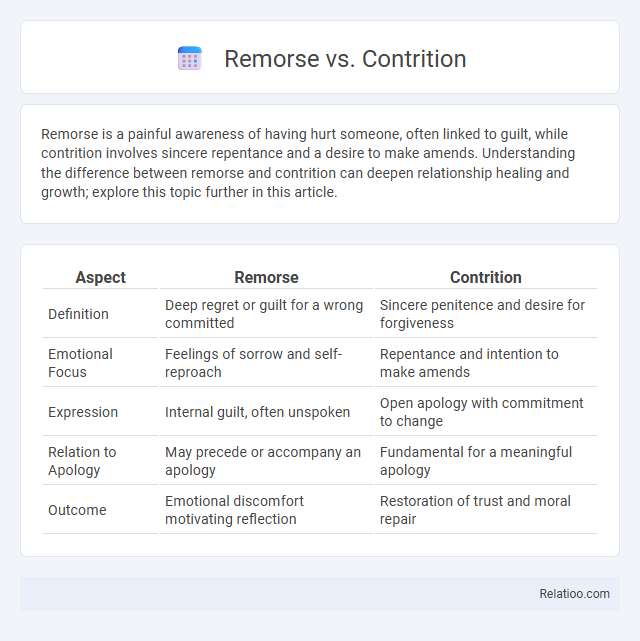Remorse is a painful awareness of having hurt someone, often linked to guilt, while contrition involves sincere repentance and a desire to make amends. Understanding the difference between remorse and contrition can deepen relationship healing and growth; explore this topic further in this article.
Table of Comparison
| Aspect | Remorse | Contrition |
|---|---|---|
| Definition | Deep regret or guilt for a wrong committed | Sincere penitence and desire for forgiveness |
| Emotional Focus | Feelings of sorrow and self-reproach | Repentance and intention to make amends |
| Expression | Internal guilt, often unspoken | Open apology with commitment to change |
| Relation to Apology | May precede or accompany an apology | Fundamental for a meaningful apology |
| Outcome | Emotional discomfort motivating reflection | Restoration of trust and moral repair |
Understanding Remorse and Contrition
Remorse and contrition both reflect feelings of guilt but differ in depth and intent, with remorse being a deep, emotional regret for wrongdoing, while contrition involves sincere repentance and a desire to make amends. Understanding remorse means recognizing emotional pain linked to guilt without necessarily prompting corrective action, whereas contrition emphasizes a proactive commitment to change and seeking forgiveness. Your ability to distinguish these emotions can enhance emotional intelligence and improve personal accountability in conflict resolution.
Defining Remorse: Key Characteristics
Remorse is a profound emotional response characterized by intense guilt and regret for actions that have caused harm or wrongdoing, often accompanied by a sincere desire to make amends. It involves a deep personal acknowledgment of fault and the emotional pain associated with moral failure. Unlike simple regret, remorse is marked by empathy toward those affected and a commitment to change behavior to prevent future harm.
Unpacking Contrition: What Sets It Apart
Contrition stands apart from remorse and general regret due to its deep sense of sincere repentance and desire for forgiveness, often linked to moral or religious contexts. Unlike remorse, which may involve guilt without a commitment to change, contrition involves acknowledgment of wrongdoing and a commitment to amend one's behavior. This profound emotional state motivates restorative actions and aligns closely with spiritual or ethical frameworks emphasizing redemption.
Emotional Depth: Remorse vs Contrition
Remorse reflects a deep emotional response characterized by intense guilt and sorrow for a wrongdoing, often accompanied by a strong desire to make amends. Contrition involves sincere repentance and heartfelt regret, emphasizing moral awareness and a commitment to change, often driven by spiritual or ethical considerations. The emotional depth of remorse is typically more personal and acute, while contrition integrates emotional pain with a conscious resolve for forgiveness and transformation.
Psychological Roots of Each Response
Remorse arises from self-awareness of wrongdoing coupled with feelings of guilt and regret, reflecting an emotional response linked to personal moral standards. Contrition involves a deeper, more sincere acknowledgment of fault, often tied to spiritual or ethical beliefs driving the desire for forgiveness and inner change. Understanding these psychological roots helps you navigate your emotional responses and fosters more genuine healing after mistakes.
Behavioral Expressions: How Remorse and Contrition Look
Remorse manifests as visible distress and regret, often characterized by tearfulness, lowered gaze, and verbal apologies, indicating Your recognition of harm done. Contrition involves a deeper behavioral change, including proactive efforts to make amends and consistent displays of humility and responsibility. Understanding these differences helps in interpreting sincerity and commitment to personal growth.
Role in Seeking Forgiveness
Remorse is the deep regret and emotional pain experienced after recognizing a wrongdoing, often motivating individuals to seek forgiveness. Contrition goes beyond remorse by including sincere repentance and a genuine commitment to change behavior as part of the forgiveness process. While both feelings influence seeking forgiveness, contrition is more explicitly linked to the moral and spiritual responsibility of making amends and restoring relationships.
Impact on Relationships
Remorse and contrition both involve feeling regret for wrongdoing, but contrition carries a deeper sense of genuine sorrow and a commitment to make amends, which significantly strengthens trust in relationships. Your authentic contrition fosters healing and reconciliation by showing that you value the other person's feelings and are willing to change behavior. Merely expressing remorse without true contrition may leave relationships strained, as it can seem insincere or insufficient to repair emotional damage.
Cultural and Religious Perspectives
Remorse, contrition, and penitence each reflect varying degrees of guilt and repentance influenced by cultural and religious contexts. In Christianity, contrition involves heartfelt sorrow for sin and a firm resolve to amend, often linked to confession and absolution rituals, while remorse might be seen as a more personal emotional response without the commitment to change. In some Eastern religions and cultural traditions, penitence emphasizes corrective actions and spiritual purification, highlighting communal harmony and moral restoration rather than individual guilt alone.
Choosing the Right Path: Overcoming Guilt
Remorse, contrition, and repentance each represent different depths of guilt and emotional response, with remorse reflecting deep sorrow for wrongdoing, contrition embodying heartfelt sorrow coupled with a resolve to amend, and repentance emphasizing active change and commitment to avoid future errors. Choosing the right path involves recognizing your emotional state and transforming your guilt into constructive actions that promote personal growth and healing. Embracing contrition and repentance allows you to overcome guilt effectively by fostering genuine change and reconciliation with yourself and others.

Infographic: Remorse vs Contrition
 relatioo.com
relatioo.com